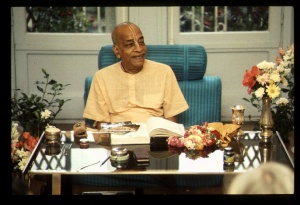SB 4.29.59: Difference between revisions
m (1 revision(s)) |
(Vanibot #0054 edit - transform synonyms into clickable links, which search similar occurrences) |
||
| (One intermediate revision by one other user not shown) | |||
| Line 1: | Line 1: | ||
{{info | {{info | ||
|speaker=King | |speaker=King Prācīnabarhiṣat | ||
|listener= | |listener=Nārada Muni | ||
}} | }} | ||
[[Category:Srimad-Bhagavatam - Canto 04 Chapter 29]] | |||
[[Category:Bhagavatam Verses Spoken by Pracinabarhisat Maharaja - Vanisource|042959]] | |||
<div style="float:left">'''[[Srimad-Bhagavatam]] - [[SB 4|Fourth Canto]] - [[SB 4.29: Talks Between Narada and King Pracinabarhi|Chapter 29: Talks Between Nārada and King Prācīnabarhi]]'''</div> | |||
<div style="float:right">[[File:Go-previous.png|link=SB 4.29.58]] '''[[SB 4.29.58]] - [[SB 4.29.60]]''' [[File:Go-next.png|link=SB 4.29.60]]</div> | |||
{{RandomImage}} | |||
==== TEXT 59 ==== | ==== TEXT 59 ==== | ||
<div | <div class="verse"> | ||
iti veda-vidāṁ vādaḥ | :iti veda-vidāṁ vādaḥ | ||
śrūyate tatra tatra ha | :śrūyate tatra tatra ha | ||
karma yat kriyate proktaṁ | :karma yat kriyate proktaṁ | ||
parokṣaṁ na prakāśate | :parokṣaṁ na prakāśate | ||
</div> | </div> | ||
| Line 16: | Line 22: | ||
==== SYNONYMS ==== | ==== SYNONYMS ==== | ||
<div | <div class="synonyms"> | ||
''[//vanipedia.org/wiki/Special:VaniSearch?s=iti&tab=syno_o&ds=1 iti]'' — thus; ''[//vanipedia.org/wiki/Special:VaniSearch?s=veda&tab=syno_o&ds=1 veda]-[//vanipedia.org/wiki/Special:VaniSearch?s=vidām&tab=syno_o&ds=1 vidām]'' — of persons who know the Vedic conclusions; ''[//vanipedia.org/wiki/Special:VaniSearch?s=vādaḥ&tab=syno_o&ds=1 vādaḥ]'' — the thesis; ''[//vanipedia.org/wiki/Special:VaniSearch?s=śrūyate&tab=syno_o&ds=1 śrūyate]'' — is heard; ''[//vanipedia.org/wiki/Special:VaniSearch?s=tatra&tab=syno_o&ds=1 tatra] [//vanipedia.org/wiki/Special:VaniSearch?s=tatra&tab=syno_o&ds=1 tatra]'' — here and there; ''[//vanipedia.org/wiki/Special:VaniSearch?s=ha&tab=syno_o&ds=1 ha]'' — certainly; ''[//vanipedia.org/wiki/Special:VaniSearch?s=karma&tab=syno_o&ds=1 karma]'' — the activity; ''[//vanipedia.org/wiki/Special:VaniSearch?s=yat&tab=syno_o&ds=1 yat]'' — what; ''[//vanipedia.org/wiki/Special:VaniSearch?s=kriyate&tab=syno_o&ds=1 kriyate]'' — is performed; ''[//vanipedia.org/wiki/Special:VaniSearch?s=proktam&tab=syno_o&ds=1 proktam]'' — as it was said; ''[//vanipedia.org/wiki/Special:VaniSearch?s=parokṣam&tab=syno_o&ds=1 parokṣam]'' — unknown; ''[//vanipedia.org/wiki/Special:VaniSearch?s=na&tab=syno_o&ds=1 na] [//vanipedia.org/wiki/Special:VaniSearch?s=prakāśate&tab=syno_o&ds=1 prakāśate]'' — is not directly manifested. | |||
</div> | </div> | ||
| Line 23: | Line 29: | ||
==== TRANSLATION ==== | ==== TRANSLATION ==== | ||
<div | <div class="translation"> | ||
The expert knowers of the Vedic conclusions say that one enjoys or suffers the results of his past activities. But practically it is seen that the body that performed the work in the last birth is already lost. So how is it possible to enjoy or suffer the reactions of that work in a different body? | The expert knowers of the Vedic conclusions say that one enjoys or suffers the results of his past activities. But practically it is seen that the body that performed the work in the last birth is already lost. So how is it possible to enjoy or suffer the reactions of that work in a different body? | ||
</div> | </div> | ||
| Line 30: | Line 36: | ||
==== PURPORT ==== | ==== PURPORT ==== | ||
<div | <div class="purport"> | ||
Atheists want evidence for the resultant actions of past activities. Therefore they ask, "Where is the proof that I am suffering and enjoying the resultant actions of past karma?" They have no idea how the subtle body carries the results of the present body's actions down to the next gross body. The present body may be finished grossly, but the subtle body is not finished; it carries the soul to the next body. Actually the gross body is dependent on the subtle body. Therefore the next gross body must suffer and enjoy according to the subtle body. The soul is carried by the subtle body continuously until liberated from gross material bondage. | Atheists want evidence for the resultant actions of past activities. Therefore they ask, "Where is the proof that I am suffering and enjoying the resultant actions of past ''karma''?" They have no idea how the subtle body carries the results of the present body's actions down to the next gross body. The present body may be finished grossly, but the subtle body is not finished; it carries the soul to the next body. Actually the gross body is dependent on the subtle body. Therefore the next gross body must suffer and enjoy according to the subtle body. The soul is carried by the subtle body continuously until liberated from gross material bondage. | ||
</div> | </div> | ||
__NOTOC__ | |||
<div style="float:right; clear:both;">[[File:Go-previous.png|link=SB 4.29.58]] '''[[SB 4.29.58]] - [[SB 4.29.60]]''' [[File:Go-next.png|link=SB 4.29.60]]</div> | |||
__NOTOC__ | |||
__NOEDITSECTION__ | |||
Latest revision as of 21:47, 18 February 2024

A.C. Bhaktivedanta Swami Prabhupada
TEXT 59
- iti veda-vidāṁ vādaḥ
- śrūyate tatra tatra ha
- karma yat kriyate proktaṁ
- parokṣaṁ na prakāśate
SYNONYMS
iti — thus; veda-vidām — of persons who know the Vedic conclusions; vādaḥ — the thesis; śrūyate — is heard; tatra tatra — here and there; ha — certainly; karma — the activity; yat — what; kriyate — is performed; proktam — as it was said; parokṣam — unknown; na prakāśate — is not directly manifested.
TRANSLATION
The expert knowers of the Vedic conclusions say that one enjoys or suffers the results of his past activities. But practically it is seen that the body that performed the work in the last birth is already lost. So how is it possible to enjoy or suffer the reactions of that work in a different body?
PURPORT
Atheists want evidence for the resultant actions of past activities. Therefore they ask, "Where is the proof that I am suffering and enjoying the resultant actions of past karma?" They have no idea how the subtle body carries the results of the present body's actions down to the next gross body. The present body may be finished grossly, but the subtle body is not finished; it carries the soul to the next body. Actually the gross body is dependent on the subtle body. Therefore the next gross body must suffer and enjoy according to the subtle body. The soul is carried by the subtle body continuously until liberated from gross material bondage.